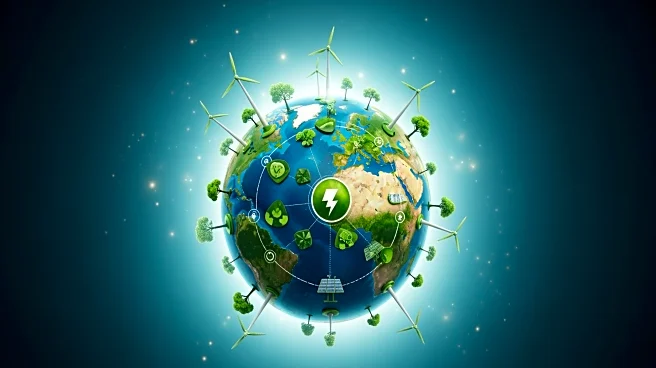What's Happening?
President Trump's decision to skip the COP30 climate summit in Belém, Brazil, has placed the European Union in a challenging position. The EU, facing internal struggles with its green transition and external
diplomatic pressures, is attempting to lead global climate efforts without U.S. support. The absence of the U.S., a major player in climate negotiations, complicates the EU's ability to persuade other countries, such as China and India, to commit to more ambitious climate actions. The EU aims to send a message to the Trump administration about the isolation of its fossil fuel policies, but faces accusations of hypocrisy due to its own domestic challenges.
Why It's Important?
The absence of the U.S. at COP30 underscores the shifting dynamics in global climate leadership. The EU's efforts to fill the void left by the U.S. highlight the challenges of maintaining momentum in international climate negotiations. The situation reflects broader geopolitical tensions and the complexities of coordinating global climate policies. The EU's leadership role is crucial in advancing climate goals, but its effectiveness is hindered by internal divisions and external pressures. The outcome of COP30 could influence future climate policies and international cooperation, impacting global efforts to address climate change.
What's Next?
The EU will continue to push for stronger climate commitments from other nations at COP30, despite the absence of U.S. leadership. The bloc may need to strengthen its diplomatic efforts and address internal policy challenges to enhance its credibility. The EU's ability to lead effectively will depend on its capacity to navigate geopolitical tensions and build alliances with other major polluters. Future climate negotiations may require new strategies to engage countries resistant to ambitious climate actions. The EU's role in shaping global climate policy will be closely watched as it seeks to balance domestic and international priorities.
Beyond the Headlines
The EU's leadership challenges at COP30 highlight the ethical and political dimensions of global climate negotiations. The bloc's efforts to promote climate action are complicated by accusations of hypocrisy and the need to reconcile economic interests with environmental goals. The situation raises questions about the effectiveness of international agreements and the role of major powers in driving climate change solutions. The EU's experience at COP30 may offer insights into the complexities of global governance and the importance of collaborative approaches to address transnational issues.











